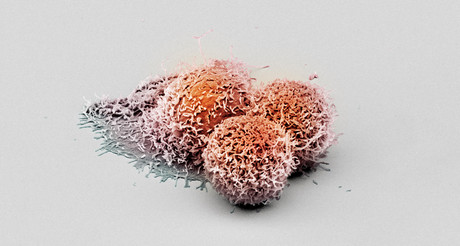New anticancer protein found to suppress liver tumours

A newly discovered anticancer protein has been found to prevent the uncontrolled proliferation of cancer cells in the liver, according to researchers from the University of Basel. Their work has been published in the journal Nature.
The incidence of liver cancer, also known as hepatocellular carcinoma, is steadily increasing around the world, with liver tumours developing from mutated cells that grow and proliferate uncontrollably. Anticancer proteins (so-called tumour suppressors) prevent uncontrolled cell growth, but are often defective in cancer cells. And with hepatocellular carcinoma usually diagnosed at a very late stage, when the liver is already severely damaged, overall prognosis is poor.
Now, researchers led by Professor Michael N Hall have discovered a so-far-unknown tumour suppressor: the protein LHPP, a phosphatase that removes histidine-linked phosphate groups from proteins. Like all amino acids, histidine is a basic component of proteins — but histidine phosphorylation of proteins has until now been poorly investigated due to the lack of suitable tools.
“Tony Hunter, from the Salk Institute in the USA, has provided us with new tools to analyse histidine phosphorylation,” said Sravanth Hindupur, first author on the study. “We have now been able to visualise a whole new layer of complexity in tumour formation.”
The researchers generated a mouse model for hepatocellular carcinoma by activating mTOR signalling specifically in the liver. They analysed a total of more than 4000 proteins, comparing them in healthy and tumour tissue. One enzyme emerged as the clear favourite: LHPP.
“It is striking that LHPP is present in healthy tissue and completely absent in tumour tissue,” said Hindupur.
Both disease severity and life expectancy were found to correlate with LHPP levels, with the loss of LHPP promoting tumour growth and reducing the chance of survival. With complete loss of the tumour suppressor, cancer patients die on average two years earlier.
“We … saw a striking decrease in LHPP levels in tumours of patients with liver cancer,” said Hindupur. Meanwhile, reintroduction of the genetic information for LHPP was found to prevent the formation of tumours and maintain liver function.
So what makes LHPP so special? According to the researchers, its absence causes global protein histidine phosphorylation to increase, which can lead to activation of several important functions and uncontrolled cell proliferation. This absence promotes the growth of tumours via increasing histidine-phosphorylated proteins.
The researchers believe LHPP could be used as a biomarker for the diagnosis and prognosis of liver cancer, enabling clinicians to provide better treatment options. They additionally hypothesise that the tumour suppressor may also play a role in the development of other cancers.
ADHD may be linked with an increased risk of dementia
An adult brain affected by attention deficit hyperactivity disorder (ADHD) presents modifications...
Placebos appear to reduce PMS symptoms
Women affected by premenstrual syndrome (PMS) appear to experience less intense and debilitating...
Medicinal cannabis linked to long-term health benefits
As scientists find a way to improve the effectiveness of CBD, a separate study shows that...




